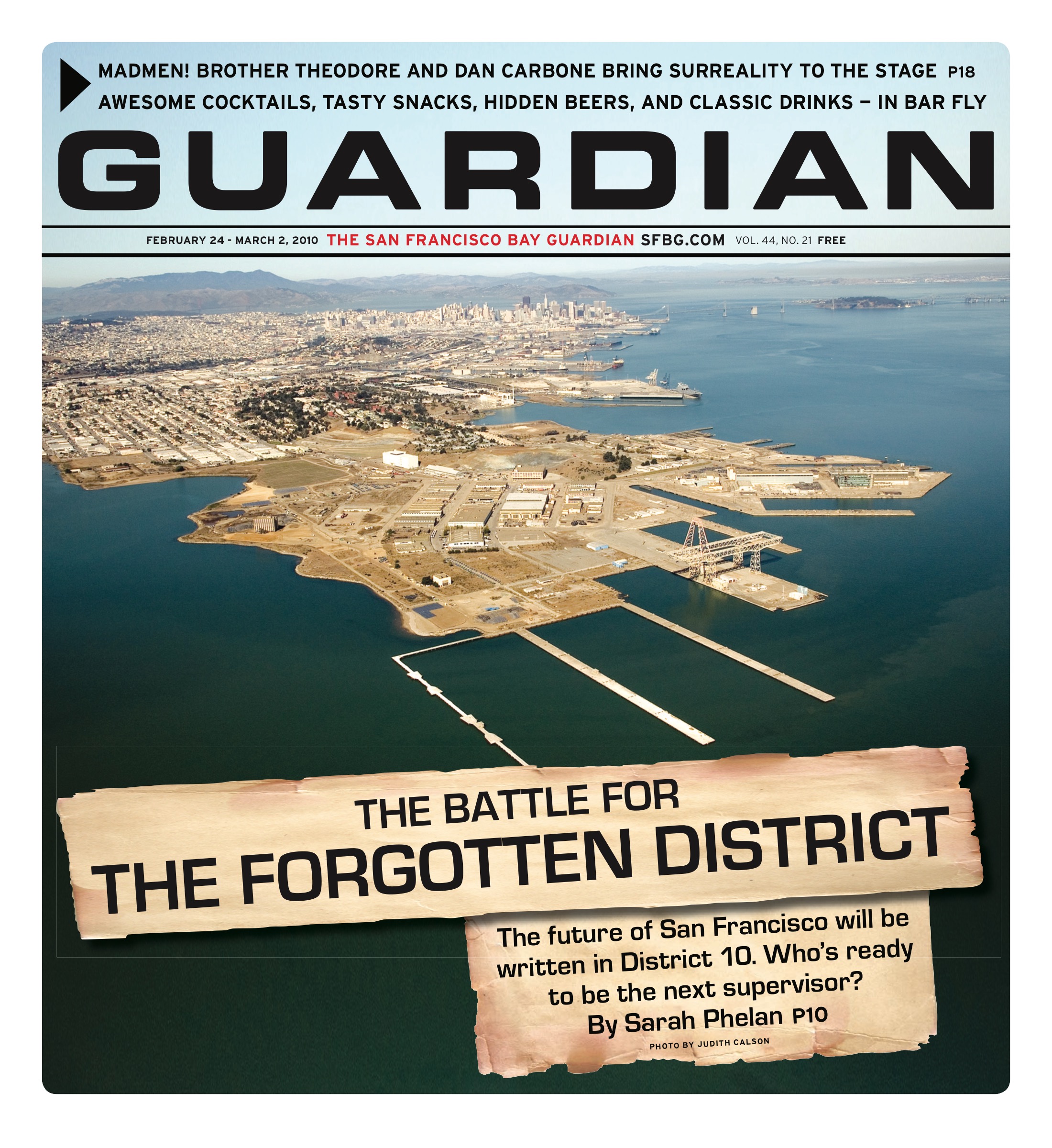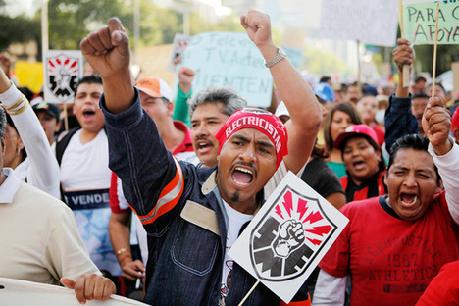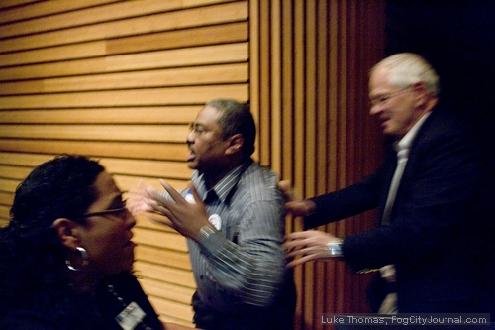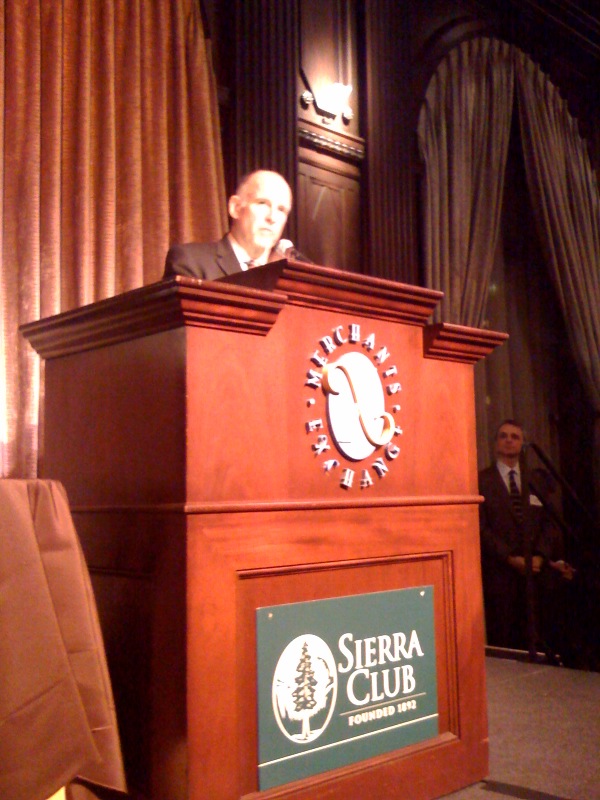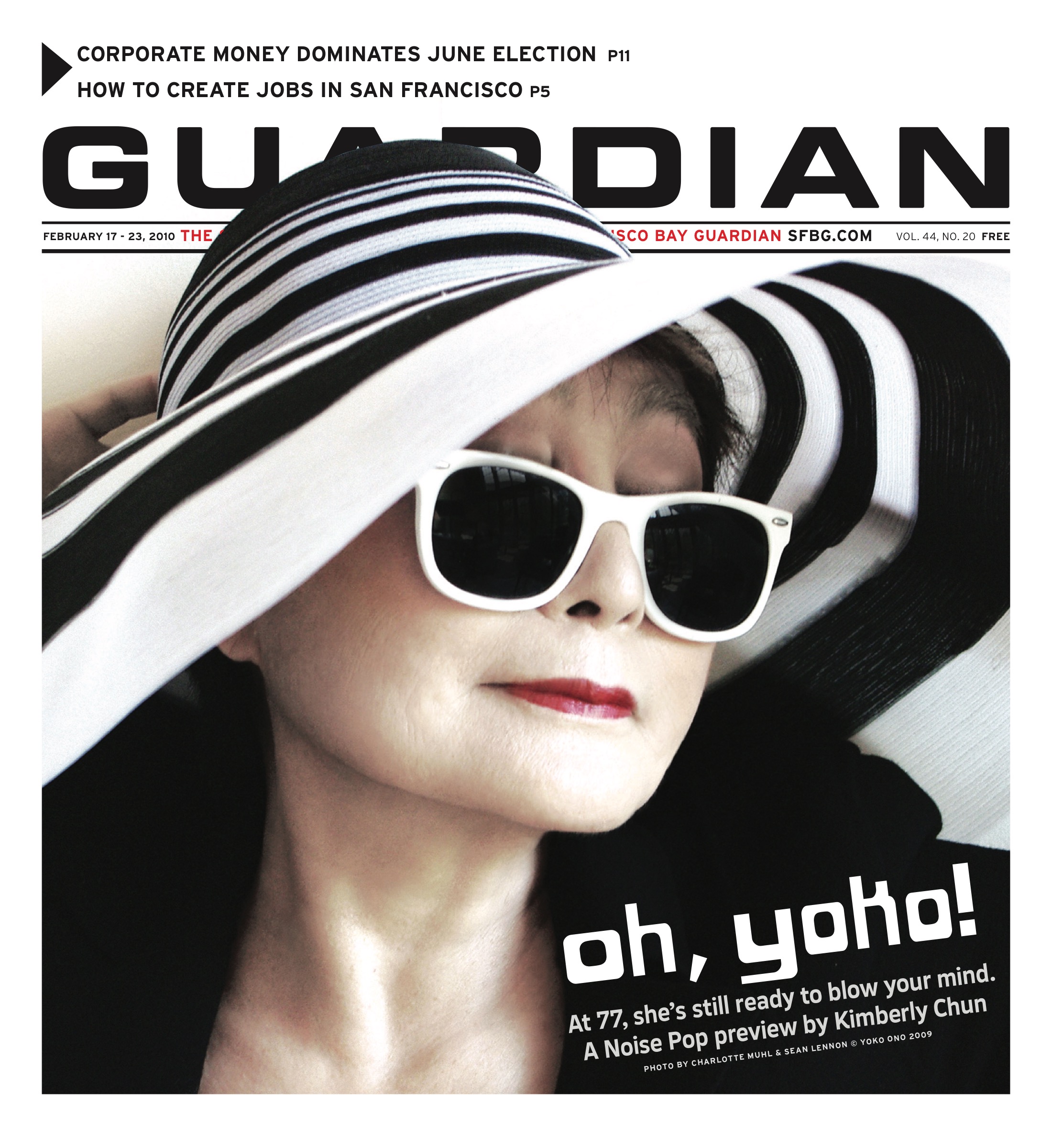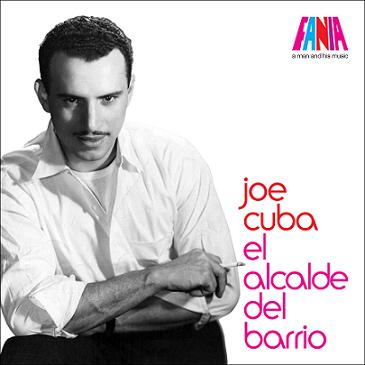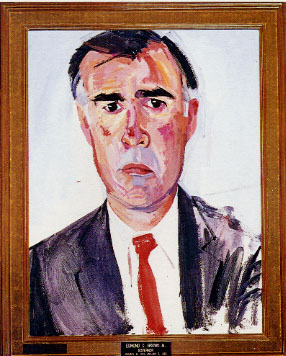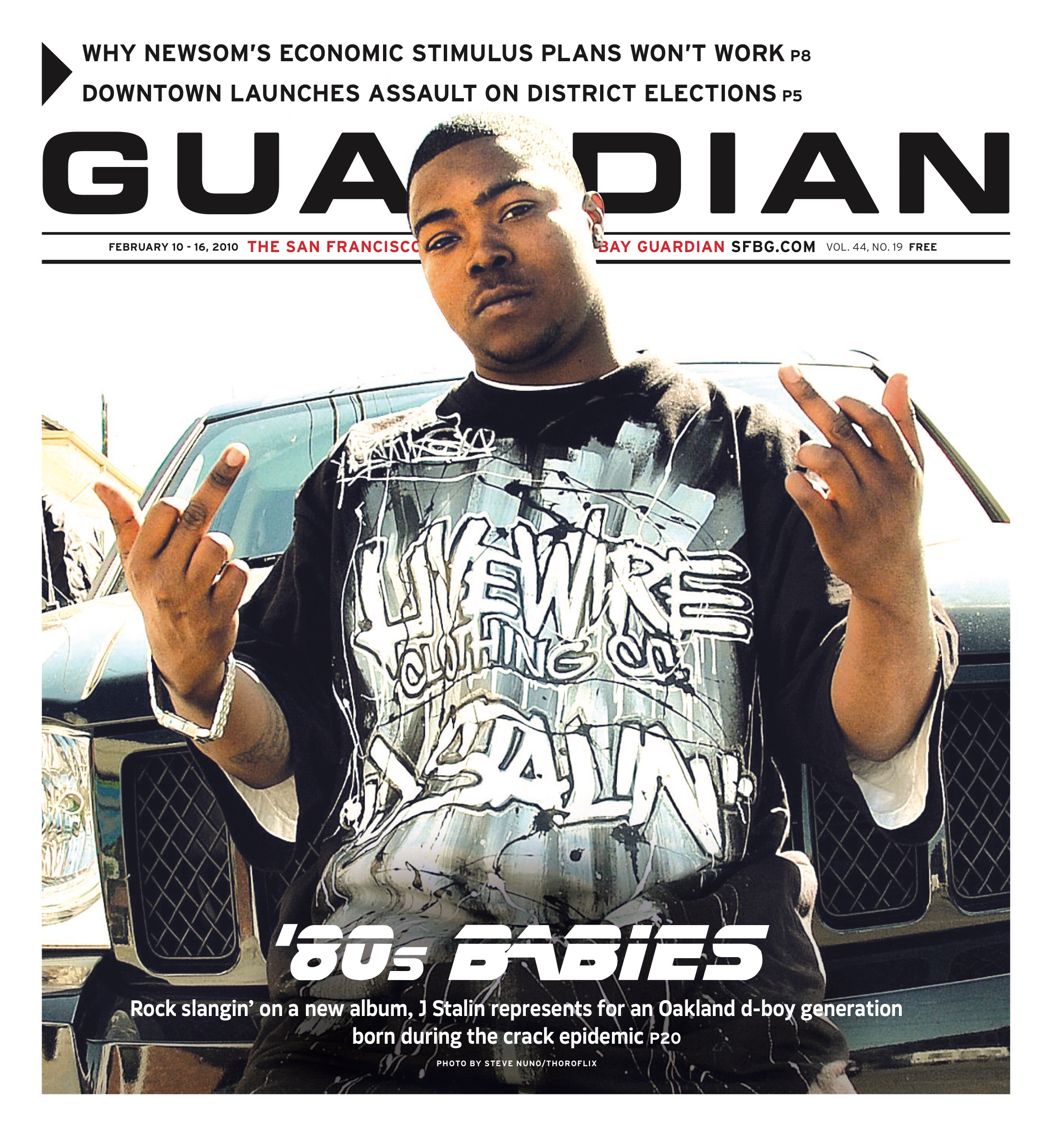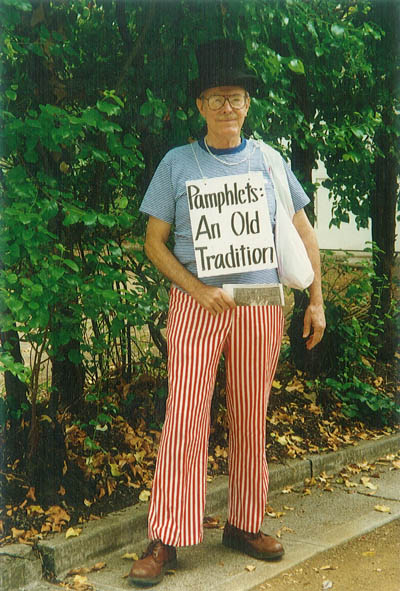Music listings are compiled by Paula Connelly and Cheryl Eddy. Since club life is unpredictable, it’s a good idea to call ahead to confirm bookings and hours. Prices are listed when provided to us. Submit items at listings@sfbg.com.
WEDNESDAY 24
ROCK/BLUES/HIP-HOP
Kasey Anderson, Matthew Ryan, Allen Stone, Andrew Belle Hotel Utah. 8pm, $8.
Foreign Born, Fresh and Onlys, Free Energy, Splinters Rickshaw Stop. 8pm, $14.
Ghost of a Saber Toothed Tiger, Cornelius, If By Yes, Hirotaka Shimizu Independent. 8pm, $20.
Pepi Ginsberg, Pepper Rabbit Hemlock Tavern. 9pm, $7.
Harlem, Sandwitches, Young Prisms Café du Nord. 8pm, $12.
Left Alone, Bum City Saints, Hounds and Harlots Thee Parkside. 8pm, $8.
Richard Thompson Band Great American Music Hall. 8pm, $28.
Rogue Wave, Princeton, Man/Miracle, Two Sheds Bottom of the Hill. 8pm, $15.
Sideshow Fiasco, Kajillion, Illness El Rio. 7pm, $5.
Sioux City Kid, Vandella, Landlords Red Devil Lounge. 8pm, $8.
FOLK/WORLD/COUNTRY
Michael Abraham Jazz Session, Gaucho Amnesia. 8pm, free.
Michael Rose with Dubtronic Kru Rockit Room. 9pm, $25.
DANCE CLUBS
Booty Call Q-Bar, 456 Castro; www.bootycallwednesdays.com. 9pm. Juanita Moore hosts this dance party, featuring DJ Robot Hustle.
Club Shutter Elbo Room. 10pm, $5. Goth with DJs Nako, Omar, and Justin.
Hands Down! Bar on Church. 9pm, free. With DJs Claksaarb, Mykill, and guests spinning indie, electro, house, and bangers.
Jam Wednesday Infusion Lounge. 10pm, free. DJ Slick Dee.
Mary-Go-Round LookOut, 3600 16th St., SF; (415) 431-0306. 10pm, $5. A weekly drag show with hosts Cookie Dough, Pollo Del Mar, and Suppositori Spelling.
RedWine Social Dalva. 9pm-2am, free. DJ TophOne and guests spin outernational funk and get drunk.
Respect Wednesdays End Up. 10pm, $5. Rotating DJs Daddy Rolo, Young Fyah, Irie Dole, I-Vier, Sake One, Serg, and more spinning reggae, dancehall, roots, lovers rock, and mash ups.
Synchronize Il Pirata, 2007 16th St.; (415) 626-2626. 10pm, free. Psychedelic dance music with DJs Helios, Gatto Matto, Psy Lotus, Intergalactoid, and guests.
Yoruba Dance Sessions Bacano! Som., 2925 16th St., SF; (415) 558-8521. 9pm, free. With resident DJ Carlos Mena and guests spinning afro-deep-global-soulful-broken-techhouse.
THURSDAY 25
ROCK/BLUES/HIP-HOP
Dan Black, Free Energy 330 Ritch. 9pm, $10-13.
Curtis Bumpy Coda. 9pm, $7.
Citay, Scout Niblett, Greg Ashley, Tape Deck Mountain Café du Nord. 8pm, $14.
*Cute Lepers, Clorox Girls, Primitivas, Boats! Thee Parkside. 9pm, $8.
Dodos, Magik*Magik Orchestra Palace of Fine Arts, 3301 Lyon, SF; www.ticketmaster.com. 8pm, $25.
Shane Dwight Biscuits and Blues. 8pm, $15.
Far, Stomacher, Picture Atlantic, Trophy Fire Bottom of the Hill. 8pm, $14.
Robert Grashaw Amnesia. 7pm, free.
Bill Kreutzmann with Oteil Burbridge and Scott Murawski Independent. 9pm, $25.
Moe. Fillmore. 8pm, $37.50.
Richard Thompson Band Great American Music Hall. 8pm, $28.
Slow Children, Wobbly and Preshish Moments, Maleficia, Alexandra Buschman Amnesia. 9pm, $5.
Space Monkey Gangstas, RU36, 5 Days Dirty, Release Slim’s. 8:30pm, $13.
*Toasters, Inciters, Monkey Red Devil Lounge. 8pm, $12.
*"Tribute to Johnny Cash" Knockout. 8pm, $10. With Glen Earl Brown Jr., B Stars, Royal Deuces, Big B and His Snake Oil Saviors, and more.
Zaimph, Vodka Soap, Bill Orcutt, Stellar OM Source Hemlock Tavern. 9pm, $7.
Zee Avi, Hot Toddies, Leslie and the Badgers Rickshaw Stop. 8pm, $14.
FOLK/WORLD/COUNTRY
Bluegrass and Old Time Jam Atlas Café. 8pm, free.
DANCE CLUBS
Afrolicious Elbo Room. 9:30pm, $5-6. DJs Pleasuremaker and Señor Oz spin Afrobeat, Tropicália, electro, samba, and funk.
Caribbean Connection Little Baobab, 3388 19th St; 643-3558. 10pm, $3. DJ Stevie B and guests spin reggae, soca, zouk, reggaetón, and more.
Drop the Pressure Underground SF. 6-10pm, free. Electro, house, and datafunk highlight this weekly happy hour.
Ejector DNA Lounge. 9pm, $10. Synthpop with Robot Bomb Shelter and DJs Chris Zachos, Dabecy, and Papa Tony.
Funky Rewind Skylark. 9pm, free. DJ Kung Fu Chris, MAKossa, and rotating guest DJs spin heavy funk breaks, early hip-hop, boogie, and classic Jamaican riddims.
Good Foot Yoruba Dance Sessions Bacano! Som., 2925 16th St., SF; (415) 558-8521. 9pm, free. A James Brown tribute with resident DJs Haylow, A-Ron, and Prince Aries spinning R&B, Hip hop, funk, and soul.
Gymnasium Matador, 10 6th St., SF; (415) 863-4629. 9pm, free. With DJ Violent Vickie and guests spinning electro, hip hop, and disco.
Heat Icon Ultra Lounge. 10pm, free. Hip-hop, R&B, reggae, and soul.
Kick It Bar on Church. 9pm. Hip-hop with DJ Jorge Terez.
Koko Puffs Koko Cocktails, 1060 Geary; 885-4788. 10pm, free. Dubby roots reggae and Jamaican funk from rotating DJs.
La Riots Manor West, 750 Harrison, SF; (415) 407-4565. 10pm, $10.
Mestiza Bollywood Café, 3376 19th St., SF; (415) 970-0362. 10pm, free. Showcasing progressive Latin and global beats with DJ Juan Data.
Peaches Skylark, 10pm, free. With an all female DJ line up featuring Deeandroid, Lady Fingaz, That Girl, and Umami spinning hip hop.
Popscene 330 Rich. 10pm, $10. Rotating DJs spinning indie, Britpop, electro, new wave, and post-punk.
Represent Icon Lounge. 10pm, $5. With Resident DJ Ren the Vinyl Archaeologist and guest.
Solid Club Six. 9pm, $5. With resident DJ Daddy Rolo and rotating DJs Mpenzi, Shortkut, Polo Mo’qz and Fuze spinning roots, reggae, and dancehall.
FRIDAY 26
ROCK/BLUES/HIP-HOP
Atlas Sound, Geographer, Magic Wands, Nice Nice Great American Music Hall. 8pm, $18.
Bikefight, Sopors, Overns, Bobby Joe Ebola Pissed Off Pete’s, 4456 Mission, SF; www.pissedoffpetes.com. 9pm, $5.
Blank Stares, Wild Yaks Hemlock Tavern. 9:30pm, $7.
Rick Estrin and the Night Cats Biscuits and Blues. 8 and 10pm, $20.
Expendables, Iration, Passafire, Pour Habit, Roots Down Below Fillmore. 9pm, $19.50.
Four Tet, Nathan Fake, Rainbow Arabia, NewVillager Independent. 8pm, $18.
Judgement Day, Scissors for Lefty, Ghost and the City, Glaciers Bottom of the Hill. 9pm, $12.
Limousines, Butterfly Bones, Battlehooch Slim’s. 8pm, $14.
*Mumlers, Growlers, Sonny and the Sunsets, Ferocious Few Café du Nord. 8pm, $14.
Notorious, Darkwave Red Devil Lounge. 8pm, $10-20. Benefit for victims of the earthquake in Haiti.
Sons of Doug, Crazy Famous, Scar Pin, West Of Hotel Utah. 9pm, $6.
Thrashers Broadway Studios. 8pm.
John Vanderslice, Nurses, Honeycomb, Conspiracy of Venus Swedish American Hall (upstairs from Café du Nord). 8pm, $15.
JAZZ/NEW MUSIC
Audium 9 1616 Bush, SF; (415) 771-1616. 8:30pm, $15.
David Benoit Yoshi’s San Francisco. 8pm, $28.
Black Market Jazz Orchestra Top of the Mark. 9pm, $10.
Bryan Girard Quartet Cliff House, 1090 Point Lobos, SF; (415) 386-3330. 7pm, free.
Eric Kurtzrock Trio Ana Mandara, Ghirardelli Square, 891 Beach, SF; (415) 771-6800. 8pm, free.
Jim Butler Quartet Savanna Jazz. 8pm, $8.
"Kronos: Music from 4 Fences" Z Space, 450 Florida, SF; www.kronosquartet.org. 8pm, $25.
Joshua Redman Grace Cathedral, 1100 California, SF; www.sfjazz.org. 8pm, $25-50.
FOLK/WORLD/COUNTRY
Dogman Joe, La Gente, Justin Ancheta Elbo Room. 10pm, $10.
Lucky Road Amnesia. 9pm, $5.
Pellejo Seco Cigar Bar and Grill, 850 Montgomery, SF; www.cigarbarandgrill.com. 9pm, $7.
Pickpocket Ensemble Red Poppy Art House. 8pm, $12-$15.
Rob Reich and Craig Ventresco Amnesia. 7pm, free.
Sila presents Sahara Coda. 10pm, $10.
DANCE CLUBS
Activate! Lookout, 3600 16th St; (415) 431-0306. 9pm, $3. Face your demigods and demons at this Red Bull-fueled party.
Bar on Church 9pm. Rotating DJs Zax, Zhaldee, and Nuxx.
Blow Up Rickshaw Stop. 10pm, $10-15. With guests All Leather and Dan Sena.
Bohemian Carnival DNA Lounge. 9pm, $20. With Vau de Vire Society, Gooferman, Gun and Doll Show, DJ Smoove, and more.
Exhale, Fridays Project One Gallery, 251 Rhode Island; (415) 465-2129. 5pm, $5. Happy hour with art, fine food, and music with Vin Sol, King Most, DJ Centipede, and Shane King.
Fat Stack Fridays Koko Cocktails, 1060 Geary, SF; (415) 885-4788. 10pm, free. With rotating DJs Romanowski, B-Love, Tomas, Toph One, and Vinnie Esparza.
Gay Asian Paradise Club Eight, 1151 Folsom, SF; www.eightsf.com. 9pm, $8. Featuring two dance floors playing dance and hip hop, smoking patio, and 2 for 1 drinks before 10pm.
Good Life Fridays Apartment 24, 440 Broadway, SF; (415) 989-3434. 10pm, $10. With DJ Brian spinning hip hop, mashups, and top 40.
Gymnasium Stud. 10pm, $5. With DJs Violent Vickie and guests spinning electro, disco, rap, and 90s dance and featuring performers, gymnastics, jump rope, drink specials, and more.
Hot Chocolate Milk. 9pm, $5. With DJs Big Fat Frog, Chardmo, DuseRock, and more spinning old and new school funk.
House of Voodoo Medici Lounge, 299 9th St, SF; (415) 501-9162. 9pm, $5. With DJs Voodoo and Purgatory spinning goth, industrial, deathrock, and glam.
Look Out Weekend Bambuddha Lounge. 4pm, free. Drink specials, food menu and resident DJs White Girl Lust, Swayzee, Philie Ocean, and more.
M4M Fridays Underground SF. 10pm-2am. Joshua J and Frankie Sharp host this man-tastic party.
Rockabilly Fridays Jay N Bee Club, 2736 20th St., SF; (415) 824-4190. 9pm, free. With DJs Rockin’ Raul, Oakie Oran, Sergio Iglesias, and Tanoa "Samoa Boy" spinning 50s and 60s Doo Wop, Rockabilly, Bop, Jive, and more.
Suite Jesus 111 Minna. 9pm, $20. Beats, dancehall, reggae and local art.
Teenage Dance Craze Party Knockout. 10pm, $3. Teen beat, twisters, and surf tunes with DJs Sergio Iglesias, Russell Quann, and dX the Funky Gran Paw.
SATURDAY 27
ROCK/BLUES/HIP-HOP
!!!, Maus Haus, Sugar and Gold, My First Earthquake Mezzanine. 8pm, $20.
A Band Called Pain, Punk Funk Mob, Sistas in the Pit Pissed Off Pete’s, 4456 Mission, SF; www.pissedoffpetes.com. 9pm, $5.
Black Prairie, Trainwreck Riders, Billy and Dolly Rickshaw Stop. 8pm, $14.
Bitter Mystics, Form of Transport El Rio. 7pm, free.
*Chain and the Gang, Strange Boys, Ty Segall, Nodzzz Elbo Room. 9pm, $10.
Children of the Damned, Hangar 18, Strangers in the Night Red Devil Lounge. 8pm, $10.
Shelby Cobra, Get Dead, Sore Thumbs, New York Ninja Thee Parkside. 9pm, $6.
*Dan the Automator presents Audio Alchemy Yoshi’s San Francisco. 10:30pm, $20. With DJ Qbert, DJ Shortkut, Jazz Mafia All-Stars, and Mars-1.
Dead Souls, Luv ‘n’ Rockets Knockout. 9pm, $8. Joy Division and Love and Rockets tribute bands.
Eyes Speak Treason, Annonimato, Hemorage Thee Parkside. 3pm, free.
*Mark Kozelek, Laura Gibson, Paula Frazer, Fences Great American Music Hall. 8pm, $30.
Memory Tapes, Loquat, Birds and Batteries, Letting Up Despite Great Faults Bottom of the Hill. 9pm, $12.
PEE, True Widow, Ovens, Grass Widow Café du Nord. 8pm, $14.
*Shannon and the Clams, Pharmacy, Rantouls, Bebe McPhereson Hemlock Tavern. 9:30pm, $7.
Soundtrack of Our Lives, Nico Vega, Music for Animals, Imaad Wasif Independent. 8pm, $16.
Super Adventure Club, Blammos, Felsen Hotel Utah. 9pm, $8.
Sweedish, Sean Tabor Band, Blue Natron Kimo’s. 9pm, $8. Benefit for the Red Cross’s relief efforts in Haiti.
Earl Thomas unplugged Biscuits and Blues. 8 and 10pm, $22.
Turbonegra, Grannies, Shootin’ Lucy, Sioux City Pete and the Beggars El Rio. 10pm, $7.
We Were Promised Jetpacks, Lonely Forest, Bear Hands, Tempo No Tempo Slim’s. 8pm, $16.
JAZZ/NEW MUSIC
Al Di Meola’s World Sinfonia Palace of Fine Arts Theatre, 3301 Lyon, SF; www.sfjazz.org. 8pm, $25-65.
Audium 9 1616 Bush, SF; (415) 771-1616. 8:30pm, $15.
David Benoit Yoshi’s San Francisco. 8pm, $28.
Eric Kurtzrock Trio Ana Mandara, Ghirardelli Square, 891 Beach, SF; (415) 771-6800. 8pm, free.
Jazz Mafia presents Remix: Live Coda. 10pm, $10.
Josh Jones Cigar Bar and Grill, 850 Montgomery, SF; www.cigarbarandgrill.com. 9pm, $7.
"Kronos: Music from 4 Fences" Z Space, 450 Florida, SF; www.kronosquartet.org. 8pm, $25.
Ricardo Scales Top of the Mark. 9pm, $15.
Marlena Teich and Pete Yellin Savanna Jazz. 8pm, $8.
FOLK/WORLD/COUNTRY
California Honeydrops Red Poppy Art House. 7:30pm and 9pm, $10-$15.
Karina Denike, Lauren Cameron Klein, Aaron Novik’s Thorny Brocky Amnesia. 6pm, $5. Part of the Songbird Festival.
Killabossa, Mihaly’s Shimmering Leaves, Peace of Mind Orchestra Amnesia. 9pm, $7.
Quinteto Latino Community Music Center, 544 Capp, SF; (415) 647-6015. 8pm, free.
DANCE CLUBS
Area Codes Etiquette Lounge, 1108 Market, SF; (415) 863-3929. 10pm, $10. Celebrating the birthplace of hop hop, New York, with DJs Blaqwest and White Mike.
Bar on Church 9pm. Rotating DJs Foxxee, Joseph Lee, Zhaldee, Mark Andrus, and Niuxx.
Barracuda 111 Minna. 9pm, $5-10. Eclectic 80s music with Djs Damon, Phillie Ocean, VeeJay Satva, and Javier, plus free 80s hair and make-up by professional stylists.
Bootie DNA Lounge. 9pm, $6-12. Mash-ups with Adrian, Mysterious D, and more.
Dead After Dark Knockout. 6-9pm, free. With DJ Touchy Feely.
Fog City Wrestling DNA Lounge. 1:30pm, $5. Live wrestling show.
Go Bang! Deco SF, 510 Larkin St; (415) 346-2025. 9pm, $5. Recreating the diversity and freedom of the 70’s/ 80’s disco nightlife with DJs Stanley Frank, Steve Fabus, Nicky B., Sergio and more.
HYP Club Eight, 1151 Folsom, SF; www.eightsf.com. 10pm, free. Gay and lesbian hip hop party, featuring DJs spinning the newest in the top 40s hip hop and hyphy.
M.A.N.D.Y. Paradise Lounge. 9pm, $12.
Reggae Gold Club Six. 9pm, $15. With DJs Daddy Rolo, Polo Mo’qz, Tesfa, Serg, and Fuze spinning reggae, dancehall, and remixes.
Social Club LookOut, 3600 16th St., SF; (415) 431-0306. 9pm. Shake your money maker with DJs Lee Decker and Luke Fry.
Spirit Fingers Sessions 330 Ritch. 9pm, free. With DJ Morse Code and live guest performances.
SUNDAY 28
ROCK/BLUES/HIP-HOP
*Cannabis Corpse, Stormcrow, Voetsek, Wasteoid, Sorrower Thee Parkside. 8:30pm, $8.
Crack Sparkle El Rio. 5pm, free.
Evan Dando, Milo Jones Café du Nord. 8pm, $16.
Dizzy Balloon, Hounds Below, Visqueen, Laarks Bottom of the Hill. 1pm, $12.
Heel Draggers Thee Parkside. 4pm, free.
Valerie Orth, Theresa Perez, London Street Red Devil Lounge. 8pm, $10. Benefit for Partners in Health’s efforts to aid victims of the earthquake in Haiti.
"School of Rock Alumni Present: Haitian Relief Benefit" Café du Nord. 1pm, $15.
Edward Sharpe and the Magnetic Zeros, Watson Twins, A B and the Sea, Northern Key Bimbo’s 365 Club. 7:30pm, $22.
Chantelle Tibbs, Emily Bonn, Sirens El Rio. 7pm, $5.
FOLK/WORLD/COUNTRY
Heather Klein’s Inextinguishable Trio Red Poppy Art House. 7pm, $12-$15.
Latin Jazz Youth Ensemble of SF, Sandy Cressman and Sombra y Luz, Ray Obiedo and Mamba Caribe, Bay Area Latin Jazz All-Stars Pier 23. 3pm, $25. Proceeds to benefit Sionfonds for Haiti.
Orchestra Nostalgico, Tango No. 9 Amnesia. 8pm, $8-$10.
DANCE CLUBS
DiscoFunk Mashups Cat Club. 10pm, free. House and 70’s music.
Dub Mission Elbo Room. 9pm, $6. Dub, roots, and classic dancehall with DJ Sep, Maneesh the Twister, and guest Antiserum.
45 Club Knockout. 10pm, free. The funky side of soul with DJs dX the Funky Grandpaw, Dirty Dishes, and English Steve.
Gloss Sundays Trigger, 2344 Market, SF; (415) 551-CLUB. 7pm. With DJ Hawthorne spinning house, funk, soul, retro, and disco.
Good Clean Fun LookOut, 3600 16th St., SF; (415) 431-0306. 3pm, $2. With drink specials, DJs and tasty food.
Honey Soundsystem Paradise Lounge. 8pm-2am. "Dance floor for dancers – sound system for lovers." Got that?
Jock! Lookout, 3600 16th; 431-0306. 3pm, $2. This high-energy party raises money for LGBT sports teams.
Kick It Bar on Church. 9pm. Hip-hop with DJ Zax.
Religion Bar on Church. 3pm. With DJ Nikita.
Stag AsiaSF. 6pm, $5. Gay bachelor parties are the target demo of this weekly erotic tea dance.
MONDAY 1
ROCK/BLUES/HIP-HOP
*Magnetic Fields, Mark Eitzel Herbst Theatre, 401 Van Ness, SF; www.ticketmaster.com. 8pm, $32.50.
DANCE CLUBS
Bacano! Som., 2925 16th St., SF; (415) 558-8521. 9pm, free. With resident DJs El Kool Kyle and Santero spinning Latin music.
Black Gold Koko Cocktails, 1060 Geary; 885-4788. 10pm-2am, free. Senator Soul spins Detroit soul, Motown, New Orleans R&B, and more — all on 45!
Death Guild DNA Lounge. 9:30pm, $3-5. Gothic, industrial, and synthpop with Decay, Joe Radio, and Melting Girl.
Dressed in Black Elbo Room. 10pm, $5. Music from the shadows with DJs Deathboy and Fact.50.
King of Beats Tunnel Top. 10pm. DJs J-Roca and Kool Karlo spinning reggae, electro, boogie, funk, 90’s hip hop, and more.
M.O.M. Madrone Art Bar. 6pm, free. With DJ Gordo Cabeza and guests playing all Motown every Monday.
Manic Mondays Bar on Church. 9pm. Drink 80-cent cosmos with Djs Mark Andrus and Dangerous Dan.
Monster Show Underground SF. 10pm, $5. Cookie Dough and DJ MC2 make Mondays worth dancing about, with a killer drag show at 11pm.
Network Mondays Azul Lounge, One Tillman Pl; www.inhousetalent.com. 9pm, $5. Hip-hop, R&B, and spoken word open mic, plus featured performers.
Spliff Sessions Tunnel Top. 10pm, free. DJs MAKossa, Kung Fu Chris, and C. Moore spin funk, soul, reggae, hip-hop, and psychedelia on vinyl.
TUESDAY 2
ROCK/BLUES/HIP-HOP
Fat Tuesday Band Biscuits and Blues. 8pm, $15.
Hold Up, Jhameel, Midnight Sun Bottom of the Hill. 9pm, $8.
Inner Ear Brigade, George Hurd Ensemble, William S. Braintree Elbo Room. 9pm, $6.
Lunar Sway, Selena Garcia, See Green Red Devil Lounge. 8pm, $7.
Taken By Trees, El Perro Del Mar Café du Nord. 9pm, $15.
Unko Atama, Started-Its, Custom Kicks Knockout. 9:30pm, free.
DANCE CLUBS
Alcoholocaust Presents Argus Lounge. 9pm, free. With DJs What’s His Fuck, Taypoleon, and Mackiveli.
Eclectic Company Skylark, 9pm, free. DJs Tones and Jaybee spin old school hip hop, bass, dub, glitch, and electro.
La Escuelita Pisco Lounge, 1817 Market, SF; (415) 874-9951. 7pm, free. DJ Juan Data spinning gay-friendly, Latino sing-alongs but no salsa or reggaeton.
Rock Out Karaoke! Amnesia. 7:30pm. With Glenny Kravitz.
Share the Love Trigger, 2344 Market, SF; (415) 551-CLUB. 5pm, free. With DJ Pam Hubbuck spinning house.
Womanizer Bar on Church. 9pm. With DJ Nuxx.

